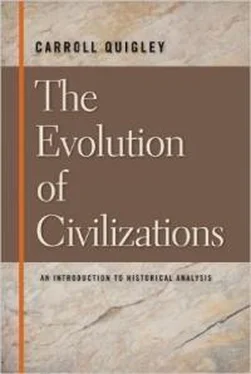The fourth aspect of any Age of Conflict, increase in irrationality, is lacking in the Greek world after 450 B.C. and was generally rare in Classical antiquity, even when this society was clearly deep in its Age of Conflict. One reason probably lies in the general tendency toward rationality that existed among the Greeks and that we have tried to attribute to their Indo-European heritage. Of even greater significance was the alliance, already mentioned, between rationalism and the triumphant oligarchy.
The critics and enemies of democracy and of the whole Athenian way of life with its emphasis on change, commerce, and social equality formed a motley bloc made up of the philosophic realists, the conservatives and rationalists, especially the Pythagoreans, the defenders of nobility, of oligarchy, and of the state's authority, the admirers of Sparta, and the enemies of science. These groups were broken and disorganized for almost a century after the revolt at Croton (510 B.C.), and were kept off balance by the long series of political and economic successes of the Athenian democracy, but when these successes were followed by a longer series of disasters after 431 B.C., the oligarchic bloc began to organize. It is extremely likely that the nucleus of this revived oligarchic movement came from the Pythagorean refugees in Thebes. In any case, it brought together the diverse groups we have mentioned. The greatest figure in this group was Plato, who, like Anaxagoras a century earlier in the opposing bloc, combined many diverse trends. The writings of Plato remain as the most successful statement of the oligarchic rationalist position, although it is frequently stated even more explicitly elsewhere, as in some of the early works of Aristotle (when he was still a Platonic rationalist), especially the first book of the Politics.
The rivalry between these two blocs appeared repeatedly in the public controversies of Athens during the century 450-350 B.C. and even later. The condemnation of Anaxagoras about 450 B.C. was as much an event in this struggle as was the trial and conviction of Pericles in 430 B.C. So also was the execution of Socrates (399 B.C.) and Plato's reaction to this deed by founding the Academy on endowments that continued for 914 years (385 D.C. A.D. 529).
There were three basic ideas of this oligarchic group: (1) that change was evil, superficial, illusory, and fundamentally impossible; (2) that all material things were misleading, illusory, distracting, and not worth seeking; and (3) that all rationally demonstrable distinctions, including those in social position (especially slavery), were based on real unchanging differences and not upon accidental or conventional distinctions. These three ideas together would serve to stop all efforts at social change, economic reform, or political equality.
These ideas, which we might sum up under some such comprehensive term as Pythagorean rationalism, were, of course, not irrational, yet they led, ultimately, to mysticism and served the same purpose of providing an ideology for the vested-interest groups that irrational thinking usually does in the Age of Conflict of any civilization. In the Age of Conflict of Classical antiquity these ideas generally triumphed, although they were challenged, generally with little effect, by the later Aristotle (after 343 B.C.), by Epicurus and Lucretius, and by numerous minor thinkers in the late Hellenistic and Roman periods. When, in the latter period, some of the sophist ideas, such as the conventional nature of slavery, became widely accepted, they were combined, as in Stoicism, with resignation and acceptance of the external appearances of things to a degree that entirely canceled the dynamic and progressive influence they had possessed when advocated by the Sophists.
It might be pointed out at this time that the triumph of the vested-interest groups (the oligarchy) in the struggles of the Age of Conflict of Classical civilization resulted in the social, political, and economic triumph of the oligarchy over the progressive and revolutionary forces. This led to the survival of the works of the intellectual supporters of oligarchy, such as Plato, Xenophon, and Cicero, and to the loss of most of the works of the opposite side, such as the writings of the Sophists and Ionian scientists; the rich were willing to pay for making copies of works favoring their position and would not pay for copying of opposition works. Thus we have today the writings of Pindar and Xenophon, but have lost those of Anaxagoras and Epicurus.
Moreover, it should be pointed out that the oligarchic victory over the forces of progress and equality did not ensure survival to the victors in the long run, or the ending of the opposition's ideology. Quite the contrary. The military tyranny that arose as a consequence of the oligarchy's efforts to maintain slavery and social inequality by force eventually took over the control of Classical society in its own name and liquidated the oligarchy and the Classical culture it had maintained. In a similar way the ideological writings of the supporters of oligarchy survived, but many of the ideas of their nominalist opponents became generally accepted. Thus individualism, the natural equality of all men, the conventional and unnatural character of slavery, and the belief that social distinctions rested on force rather than on real differences became generally accepted in the Stage of Universal Empire, but without in any way destroying the continued existence as institutions of slavery, social inequality, law, or public authority. Of course, in the very long run, with the disappearance of these institutions it might be argued that the ideas that challenged them won out, but this occurred only with the death of Classical society as a whole.
It would seem then that the period after 450 B.C. (in the eastern Mediterranean at least) had the chief, if not all, features of an Age of Conflict. Similarly, the following period in the eastern Mediterranean had many of the features of an Age of Universal Empire. These latter features continued from the establishment of Macedonian supremacy in the seventh decade of the fourth century until the disruption of Alexander's empire and the growing power of Rome threw the eastern Mediterranean back into the belated Age of Conflict still continuing in the western Mediterranean (until 146 B.C.).
The imperialist wars of the eastern Mediterranean's local Age of Conflict continued almost without interruption from the outbreak of the Peloponnesian War in 431 B.C. to the conquests of Alexander the Great a century later. Chief events in this period were the Spartan triumph over Athens in 404 B.C., the Theban victory over Sparta in 371 B.C., and the Macedonian conquest of all Greece at Chaeronea in 338 B.C. The conquests of Alexander the Great during the following fifteen years established a "core" or preliminary universal empire and some of the features of this fifth stage in the evolution of civilization continued, in spite of the subsequent breakup of that empire among the Diadochi. The chief of these features was the creation of a far-flung commercial unity that encouraged distant trade and geographic division of labor. In a full universal empire, such as existed in the Roman Empire under the Antonines, this would have been carried on to include a single monetary system, a unified legal system, and other aspects of unified rule and would have given rise to a period of peace and prosperity to which we apply the term "golden age." In Alexander's system this golden age was never reached because the core empire was disrupted and its temporary beneficial effects were obliterated by the intrusion into the eastern Mediterranean of the Age of Conflict still going on in the western Mediterranean.
The Age of Expansion in the western Mediterranean lasted from the seventh century to the middle of the third century, and thus continued for two hundred years after expansion had begun to decline in the east. It was, on the whole, somewhat different from the earlier expansion in the east, being more agricultural than commercial and more dependent on slavery. Moreover, nonindigenous peoples like the Etruscans and the Carthaginians made very considerable contributions to it. From the Etruscans, for example, came valuable contributions in regard to irrigation and drainage, while the Carthaginians developed the use of plantation slavery, especially in Sicily. Plantation slavery, which refers to the use of gangs of slaves on large estates, was always rare in Greece but became in the west the admired form of agrarian organization. It also became the mechanism by which the slave system was changed from an instrument of expansion to an institution of conflict.
Читать дальше










